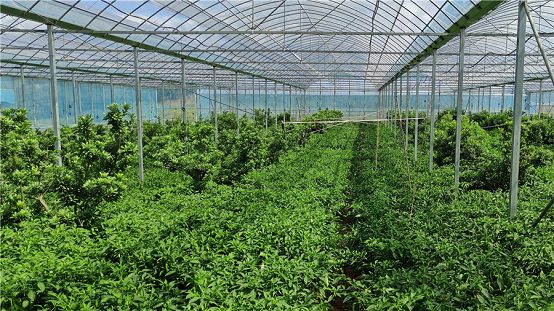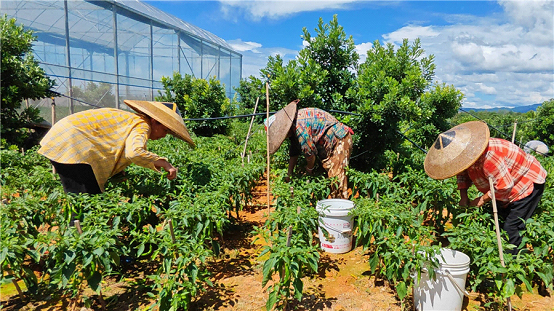Chili peppers planted by the Meiyuanxincun Fruit Co., Ltd. at Quyang Town of Jingzhou Miao and Dong Autonomous County have ushered in a harvest. Villagers are busy picking them for the market, creating a bustling scene of a bountiful harvest in the fields.
At the planting base of the company, peppers grow in rows amidst waxberry trees. After weighing and packing, the freshly picked peppers will be shipped to cities such as Changsha and Guangzhou.

Peppers grow in rows amidst waxberry trees. (Photo/Yang Yanyun)
According to Wu Changchun, manager of the Meiyuanxincun Fruit Company, the company has intercropped 80 mu (about 5.3 hectares) of chili peppers in waxberry orchards, with a yield of around 1,500 kgs per mu (about 666 square meters). The peppers grown in the base are the new varieties developed in Hunan Province, which are characterized by thick pulp, rich aroma, and mild spiciness, making them popular among consumers. Thanks to sufficient sunshine, high-quality soil, and efficient management and protection measures, the yield is gratifying, and the estimated sales revenue is expected to exceed 800,000 yuan.
Pepper cultivation not only brings considerable economic income to farmers, but also provides job opportunities for nearby villagers.
"I can earn money without traveling far away, which helps increase the household income and reduces the burden on my children," said Huang Yuanzhen, a villager from Erliangting Village. She has been working at the planting base since April, responsible for daily field management and pepper picking, earning more than 100 yuan per day. According to Huang Yuanzhen, there are more than 30 other people like her working here, earning money right at their doorstep. Everyone feels happy and becomes more motivated to work.

Villagers pick chili peppers at the field. (Photo/Pu Xiangping)
It is learned that in recent years, Jingzhou has leveraged its own resource endowments and centered on the goals of "enhancing agricultural efficiency and increasing farmers' income". With the core objective of benefiting farmers, and guided by Party building to increase momentum, it has actively explored the development path of agricultural industrialization. By developing intercropping and other models, it has not only improved land utilization and output, but also driven employment and income growth for the surrounding population, injecting new vitality into rural revitalization.
(Translated by Yang Hong)
